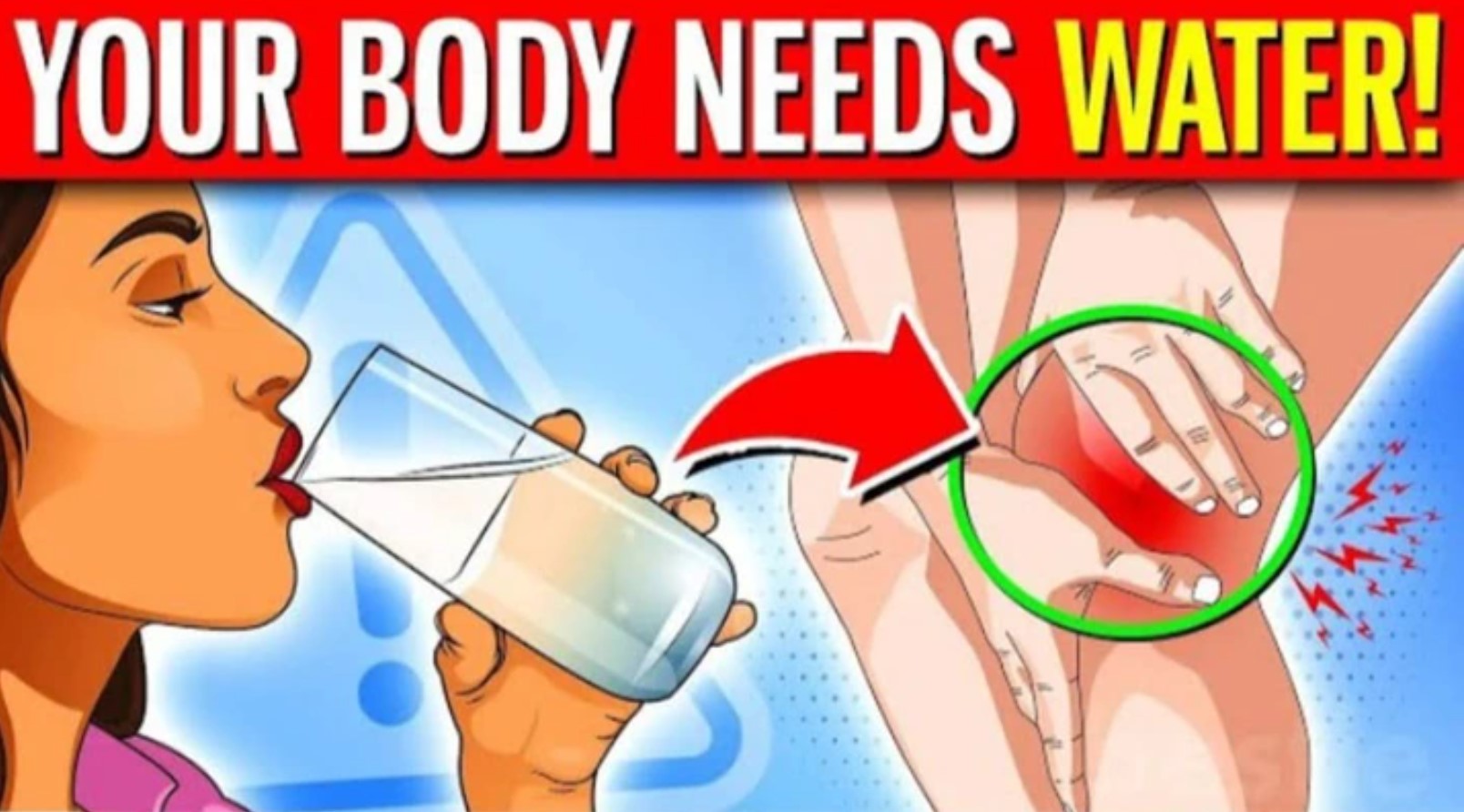We lose water from our bodies every day, be it through breathing, sweating, crying, urination, or even stool. We can get dehydrated easily. Water keeps you hydrated, keeps the organs functioning, and brain working, and makes you feel good in general. Our bodies are around 60 to 70% water, and this quantity can be reduced significantly, which can lead to a lot of health problems.
Most don’t drink enough, and the body will give signals if you need more, and today we’ll tell you what those signals are, from unexplained headaches.Bad breath, frequent illness, muscle cramps, dry skin, and more…Click Here To Continue Reading>> …Click Here To Continue Reading>>
Number one: watery eyes. A lack of water leads to dry, bloodshot eyes. Without water in the body, your tear ducts dry up. When your body senses that your eyes are not moist enough, it tries to remedy the problem by producing an abundance of tears.
Number two: unexplained headaches. Headaches are a complicated phenomenon for many. We don’t know the cause and will never find out. It could be food sensitivity, stress, an illness, or dehydration. While over-the-counter pain relievers can provide some relief, one way to help is to rehydrate the body promptly.
Number three: bad breath. Increasing the saliva in your mouth will help you get fresher breath. This can be an unfortunate symptom of dehydration, which can cause the bacteria in your mouth to multiply as the mouth dries out. Drinking a few glasses of water in between meals can help flush out food particles. This will maintain the right amount of saliva.
When you’re not drinking enough water, the production of saliva slows down, which has antibacterial properties. This makes bacteria grow faster inside your mouth, causing bad breath.
Number four: slow digestion. Digestion can slow down for all sorts of reasons. It could be something that you’ve eaten or an illness, but lack of water can have a big impact too. When you’re not getting enough, you may notice digestion slows down significantly, which could cause stomach aches or random cramps. If this is happening, try drinking more water and see if it helps.
Number five: you’re constantly thirsty. If you’re thirsty, it usually means that you need to drink water. If you’re feeling a little parched, it could mean that you’re more dehydrated than you think. A great way to check is by taking note of how many times you go to the bathroom. The average person should be going about four to 10 times a day.
This statistic is also contingent on your age and if you’re taking medication. Ultimately, if you believe that your body is dehydrated more than the average person, try setting an alarm on your phone to remind you when you should rehydrate.
Number six: dark urine. As mentioned before, if you’re making fewer than four trips to the bathroom, you likely need to hydrate more. If your urine is dark yellow instead of pale or clear, that’s another sign you’re likely not getting enough fluid. While it’s recommended that we drink water throughout the day, it’s not only water that counts towards hydration.
You can also go for tea and low-fat milk as alternatives. The food we eat also contains water. However, water should be your go-to drink of choice to avoid excess calories.
Number seven: muscle cramps. When your body loses enough fluid, it’s unable to cool itself off adequately, leading to heat illness. One symptom to look out for is muscle cramps, which can happen while exercising, particularly in hot weather. The hotter you get, the more likely you are to get muscle cramps due to a heat effect on the muscle.
As the muscles work harder, they can seize up from the heat itself. Changes in the electrolytes, such as sodium and potassium, can lead to muscle cramping as well.
Even in cooler weather, dehydration is possible if you don’t drink enough fluids while working out. Symptoms may be milder or come on slowly, but dehydration carries the same risks regardless of the temperature outside. While we’re on the topic of exercise.
Number eight: not sweating during exercise. So what happens if you don’t sweat during a workout? It could mean your body is liquid-deprived. Typically, the body overheats during exercise, so it then produces sweat to keep the core body temperature regulated. If there isn’t enough water to produce sweat, our bodies can’t regulate themselves. This can be very dangerous, as it may lead to overheating or heat stroke.
Number nine: decreased energy levels. Do you feel tired constantly, to the point where you feel you need to nap? Incorporating more water into your daily routine can help. Being dehydrated decreases your blood circulation, which can make your body conserve energy. When the muscles don’t receive enough oxygenated blood, they could cramp when you work out, and they will become fatigued. READ FULL STORY HERE>>>CLICK HERE TO CONTINUE READING>>>
If you feel this during your exercise routine, do not push yourself. Stop, drink water, and rest.
Number ten: frequent illness. Water helps flush toxins, waste, and bacteria from the body. This helps fight disease and infection, as well as strengthens your immune system so you become sick less frequently. If it seems you’re always getting sick, you may need to start drinking more water. This will keep your body free of toxins and functioning at an optimal level.
Number 11: constipation. Water promotes good digestion and regular bowel movements by keeping your stool soft and moving it easily through the digestive tract. Not drinking enough can cause your body to pull water from stool to compensate for fluid loss. If your bowel movements are irregular, try drinking more water to loosen your stool and relieve constipation and bloating.
Number 12: sugar cravings. Dehydration interferes with your body’s ability to reach into glucose stores for energy. This can trigger cravings for foods high in sugar and carbohydrates. Unusual and sudden cravings for sugary foods like chocolate, donuts, cookies, and candies may indicate that your body is in great need of water, not food.
If you’re experiencing sugar cravings or hunger pangs even though you’ve recently eaten, try drinking more water to rehydrate your body and keep cravings at bay.
Number 13: low blood pressure. More than half of the blood in the body is plasma or the liquid part of the blood. Plasma is made up of water, protein, and salt. Without enough water in your plasma, your blood will become more concentrated, and it will be difficult to flow through the body to the organs that need it leading to low blood pressure levels.
Water also carries hormones and nutrients to its destination, so when fluid consumption is reduced, this procedure starts to slow down, causing many bodily dysfunctions. This may also drop blood pressure, which can lead to dizziness. You may also experience a faster heartbeat as the heart tries to increase the blood pressure.
Number 14: joint pain. Although drinking water might not cure arthritis or other causes of joint pain, increasing the amount you drink can help treat some of the painful symptoms. You might see fluid retention in your ankles and fingers when you’re not drinking enough water. It’s important for lubricating joints, so drinking water can help with joint pain.
Number 15: dry skin. Water hydrates and plumps skin cells to make your skin look brighter, vibrant, and more youthful. However, a lack of it can cause skin to lose its plumpness and elasticity. This can lead to dryness, flakiness, fine lines, wrinkles, and sagging skin. Water even helps reduce acne and other skin problems by flushing harmful toxins from the body.
If beauty products and skin treatments are failing to improve the appearance of your skin, drink more water to achieve a more youthful appearance and reduce skin problems.
Number 16: kidney problems. Not having enough water can lead to a urinary tract infection, which can lead to a kidney infection. Kidneys filter your blood, which is mainly water, so if you’re on the dehydrated side, it puts extra stress on your kidneys. Drinking plenty of water can also prevent kidney stones.
Drinking water is one way you can make sure your body is healthy and will keep minor aches and pains away. How much water do you drink every day? Is it enough?


 SPORTS11 months ago
SPORTS11 months ago
 IN-THE-NEWS11 months ago
IN-THE-NEWS11 months ago
 METRO5 months ago
METRO5 months ago
 METRO10 months ago
METRO10 months ago
 IN-THE-NEWS11 months ago
IN-THE-NEWS11 months ago
 METRO11 months ago
METRO11 months ago
 HEALTH & LIFESTYLE5 months ago
HEALTH & LIFESTYLE5 months ago
 SPORTS10 months ago
SPORTS10 months ago


